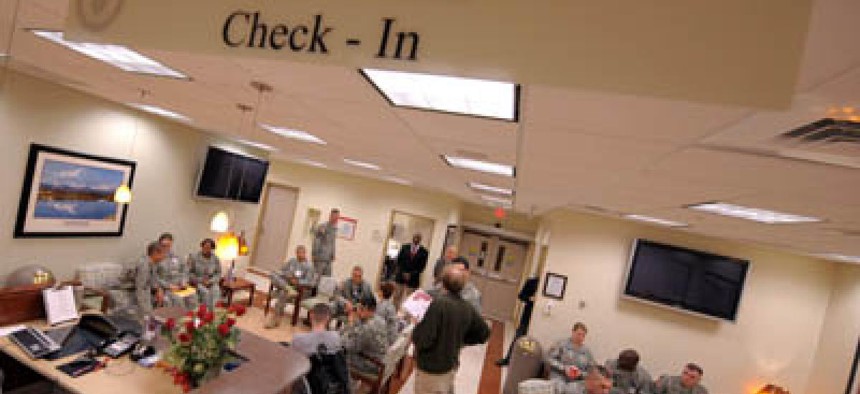
Tim Sloan/AFP/Newscom
Water main break at new Walter Reed leaves three clinics ‘unusable’
The Warrior clinic was among the areas flooded by one to two inches of water on the same day President Obama visited wounded troops at the center.
As President Obama visited combat-wounded patients at the new Walter Reed National Military Medical Center on Monday, hospital cleanup crews scrambled to contain and assess damage from a water main break that flooded three clinics and rendered them unusable, according to an internal memo provided to Government Executive.
The water main break, which inundated the three clinics in up to two inches of water, occurred on the fourth floor of an older building on the campus of the former National Naval Medical Center in Bethesda, Md., which took on its new title when the old Walter Reed Army Medical Center in Washington closed Sept. 15.
Top Walter Reed commanders were notified of the leak at 5:00 a.m. Monday, when a duty officer called Cmdr. Tim Wolfkill, assistant deputy commander for readiness and operations. Wolfkill arrived at the hospital at 6:15 a.m. and toured the building to assess the damage. "Due to the cause/origin of the water leak NSA [Naval Support Activity] Bethesda Security was contact[ed] and an investigation initiated with pictures of the site taken," the report said.
The internal executive summary report said the Warrior clinic, the Readiness clinic and new spaces housing the optometry and ophthalmology clinics -- all located in Building 8 on the 250-acre hospital campus -- had between one and two inches of water on the floor as a result of the water main break, with these clinics deemed "not usable."
Damage to equipment in these clinics resulted from a cascade of water from the leak on the fourth floor of Building 8, the report detailed. Water drained from multiple ceiling tiles of the Warrior clinic on the third floor and down the walls in the rear of the main treatment area, "with main damage over/including central staff computer desk/stations. Preliminary assessment -- the entire space is not usable," the report said.
The main lobby and reception area of the second-floor readiness clinic also was flooded between one and two inches deep with water leaking from the ceiling in multiple locations. "Several exam rooms with water leaking from ceiling and ceiling tile broken and fallen onto equipment and desks. Preliminary assessment -- reception area and two to three exam rooms affected; space is not usable," the report said.
On the first floor, leaking water in new spaces for the optometry and ophthalmology clinic broke ceiling tiles in the main reception area and in at least two examination rooms. "Preliminary assessment -- reception area and two to three exam rooms affected; space is not usable," the report said. Old space used by the Optometry Clinic now under construction experienced moderate leaking from ceiling tiles in two examination rooms, but the report found this space usable following "minimal cleanup."
The report also said water leaked onto computer servers in a "communication relay/junction box room," with the hospital's information technology staff still assessing the damage. In addition, water dripped through multiple ceiling tiles in the second floor Red Cross office main waiting room and a storage room, with those spaces unusable, though the report said Red Cross workers can use other offices. Chaplain offices on the first and second floors experienced minimal water damage with those offices deemed usable after cleanup.
Walter Reed did not respond to detailed queries about the flood by this story's publication deadline.
The National Naval Medical Center, including its iconic 20-story Art Deco main building, opened in 1942, and Building 8 opened in 1963. In 2005, the Base Realignment and Closure Commission recommended closing the old Walter Reed Army Medical Center and moving its patients and staff to the Navy's Bethesda hospital.
The master plan for the consolidation of medical facilities in the Washington area called for construction of new buildings at the new Walter Reed and construction of a hospital at Fort Belvoir, Va., with the estimated total cost of all new construction put at $829 million through 2018. The master plan also called for demolition of Building 8 in 2014.







